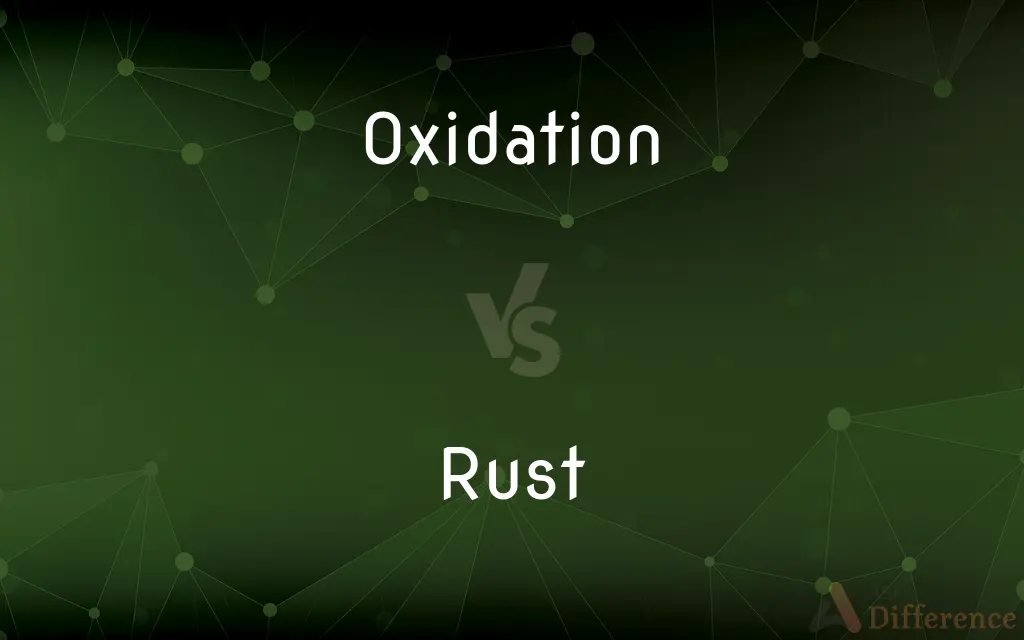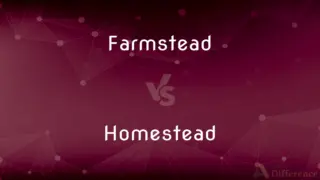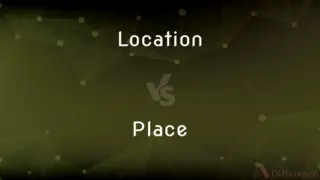Oxidation vs. Rust — What's the Difference?
By Tayyaba Rehman & Fiza Rafique — Updated on February 27, 2024
Oxidation is a chemical reaction involving the loss of electrons, affecting various substances, while rust is a specific type of oxidation that occurs on iron or steel, forming iron oxide.

Difference Between Oxidation and Rust
Table of Contents
ADVERTISEMENT
Key Differences
Oxidation and rust are related chemical processes, with oxidation being the broader term. Oxidation involves the loss of electrons when a substance interacts with oxygen, occurring in many chemical contexts, from metal corrosion to cellular respiration. This process is not limited to metals; it can affect a wide range of substances, including organic compounds and gases. Rust, on the other hand, is a specific manifestation of oxidation that happens only to iron and its alloys, leading to the formation of iron oxide. This reddish-brown compound is the result of iron reacting with oxygen and moisture in the environment.
All rust is a result of oxidation, not all oxidation results in rust. Oxidation can lead to various outcomes depending on the material involved and the conditions under which the reaction occurs. For example, the tarnishing of silver or the browning of an apple slice are forms of oxidation but are distinctly different from rust. Rust specifically refers to the corrosion of iron-based materials, damaging structures and reducing the metal's strength and integrity over time.
The conditions necessary for rust to occur include the presence of iron, oxygen, and water (or moisture in the air). Without these conditions, iron objects can resist rusting. In contrast, oxidation can happen under a broader range of conditions and does not necessarily require moisture, highlighting a key environmental difference between the two processes.
Preventing oxidation and rust involves different strategies based on their nature. For general oxidation, antioxidants can be used in chemical processes and materials to inhibit the reaction. For rust, protective coatings, galvanization, or controlled environments can prevent the exposure of iron to oxygen and moisture, mitigating rust formation.
Comparison Chart
Definition
Chemical reaction where a substance loses electrons.
Specific type of oxidation that forms iron oxide on iron/steel.
ADVERTISEMENT
Occurrence
Can affect various substances, including metals and non-metals.
Only occurs on iron and its alloys.
Products
Various, depending on the substances involved.
Specifically produces iron oxide (Fe2O3).
Required Conditions
Involves interaction with oxygen, can occur in various environments.
Requires iron, oxygen, and water/moisture.
Prevention Methods
Use of antioxidants, reducing exposure to oxygen.
Protective coatings, galvanization, controlling moisture.
Compare with Definitions
Oxidation
Can lead to corrosion in metals other than iron.
The oxidation of copper results in a green patina.
Rust
Requires moisture to form, unlike some oxidation processes.
The car rusted more quickly in the humid climate.
Oxidation
Involves a change in the oxidation state of an atom.
Oxidation turns iron into ferric oxide in rusting.
Rust
Significantly impacts the durability and strength of affected materials.
Rusting pipes need to be replaced to prevent leaks.
Oxidation
A reaction where a substance loses electrons upon exposure to oxygen.
The oxidation of glucose in the body produces energy.
Rust
Specifically involves iron or steel.
Rust on the garden tools was evident after the rainy season.
Oxidation
Can affect the quality of food.
Oxidation causes fruit to brown when exposed to air.
Rust
The reddish-brown flaky coating formed by the oxidation of iron.
Rust weakened the structure of the old bridge.
Oxidation
Occurs in combustion, producing fire.
The oxidation of wood in a fireplace creates flames.
Rust
Preventable through protective coatings.
Painting iron fences can prevent rust.
Oxidation
The process or result of oxidizing or being oxidized.
Rust
Rust is an iron oxide, a usually reddish-brown oxide formed by the reaction of iron and oxygen in the catalytic presence of water or air moisture. Rust consists of hydrous iron(III) oxides (Fe2O3·nH2O) and iron(III) oxide-hydroxide (FeO(OH), Fe(OH)3), and is typically associated with the corrosion of refined iron.
Oxidation
A reaction in which the atoms of an element lose electrons and the valence of the element is correspondingly increased.
Rust
Any of various powdery or scaly reddish-brown or reddish-yellow hydrated ferric oxides and hydroxides formed on iron and iron-containing materials by low-temperature oxidation in the presence of water.
Oxidation
The combination of a substance with oxygen.
Rust
Any of various metallic coatings, especially oxides, formed by corrosion.
Oxidation
(chemistry) A reaction in which the atoms of an element lose electrons and the oxidation state of the element increases.
Rust
The deteriorated state of iron or steel as a result of moisture and oxidation.
The rust on my bicycle chain made cycling to work very dangerous.
Oxidation
The act or process of oxidizing, or the state or result of being oxidized.
Rust
The reddish yellow coating formed on iron when exposed to moist air, consisting of ferric oxide or hydroxide; hence, by extension, any metallic film of corrosion.
Oxidation
The process of oxidizing; the addition of oxygen to a compound with a loss of electrons; always occurs accompanied by reduction
Rust
A red or brown oxide coating on iron or steel caused by the action of oxygen and moisture
Rust
A reddish-brown discoloration of leaves and stems caused by a rust fungus
Rust
The formation of reddish-brown ferric oxides on iron by low-temperature oxidation in the presence of water
Rust
Become coated with oxide
Rust
Of the color of rust
Common Curiosities
Why does iron rust?
Iron rusts due to its reaction with oxygen and moisture in the environment, forming iron oxide.
How can rust be prevented?
Rust can be prevented with protective coatings, galvanization, or by controlling exposure to moisture.
Can rust be reversed?
While rust can be removed, the process does not reverse the damage to the metal. Prevention is key.
Do all metals rust?
No, only iron and its alloys form rust; other metals undergo different forms of corrosion.
What causes oxidation?
Oxidation is caused by the interaction of a substance with oxygen, leading to the loss of electrons.
Can oxidation occur without oxygen?
While oxygen is a common oxidizer, oxidation can also occur with other chemicals that accept electrons.
Is rust harmful?
Rust can weaken iron and steel structures, making them less durable and safe.
Does rust only affect the surface of iron?
Rust starts on the surface but can penetrate deeply, compromising the integrity of the material.
Can oxidation produce energy?
Yes, in processes like cellular respiration, oxidation reactions release energy.
Is oxidation a fast process?
The rate of oxidation varies widely, from rapid combustion to slow tarnishing or rusting.
What are antioxidants?
Antioxidants are substances that inhibit oxidation, used in various fields including food preservation and materials science.
Is rusting a chemical or physical change?
Rusting is a chemical change, as it results in the formation of a new compound.
Why do some metals develop a patina instead of rusting?
Some metals react with oxygen to form protective layers that inhibit further corrosion, unlike the destructive process of rusting.
Are rust and corrosion the same?
Rust is a type of corrosion specific to iron and its alloys, while corrosion is a broader term that includes the deterioration of any material due to chemical reactions.
Can rust affect the environment?
Rust itself is not harmful to the environment, but the degradation of structures can lead to environmental and safety issues.
Share Your Discovery

Previous Comparison
Farmstead vs. Homestead
Next Comparison
Location vs. PlaceAuthor Spotlight
Written by
Tayyaba RehmanTayyaba Rehman is a distinguished writer, currently serving as a primary contributor to askdifference.com. As a researcher in semantics and etymology, Tayyaba's passion for the complexity of languages and their distinctions has found a perfect home on the platform. Tayyaba delves into the intricacies of language, distinguishing between commonly confused words and phrases, thereby providing clarity for readers worldwide.
Co-written by
Fiza RafiqueFiza Rafique is a skilled content writer at AskDifference.com, where she meticulously refines and enhances written pieces. Drawing from her vast editorial expertise, Fiza ensures clarity, accuracy, and precision in every article. Passionate about language, she continually seeks to elevate the quality of content for readers worldwide.















































